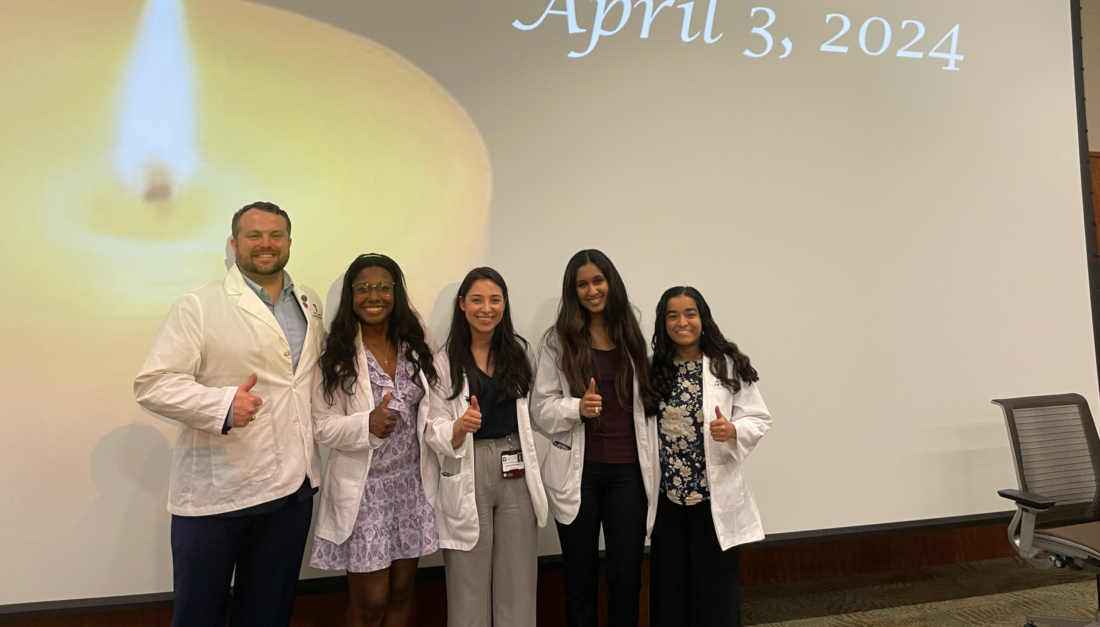System receives grant for cancer research
(COLLEGE STATION, TX) – The Cancer Prevention and Research Institute of Texas (CPRIT) today (Tuesday, March 23) presented a check totaling more than $1.1 million to The Texas A&M University System to provide support for cancer-related research by two professors.
The funds, part of CPRIT’s $61 million inaugural grants, will support research projects under the direction of Dr. Robert Chapkin, professor and University Faculty Fellow in the Department of Nutrition and Food Sciences in Texas A&M’s College of Agriculture and Life Sciences, and Dr. Darwin Prockop, professor of molecular and cellular medicine and holder of the Stearman Chair in Genome Medicine at the Texas A&M Health Science Center. Dr. Prockop also is director of the Institute for Regenerative Medicine at the center.
CPRIT was represented at the presentation by James Mansour, chairman of its Oversight Committee, and Executive Director Bill Gimson.
“I have been fortunate to have been involved with CPRIT since its inception and have no greater satisfaction than presenting these dollars to the dedicated researchers to enable them to begin working towards finding a cure for cancer,” Mansour said.
The check was formally accepted by Texas A&M System Chancellor Michael D. McKinney in ceremonies at Texas A&M’s Clayton Williams Jr. Alumni Center following welcoming remarks by Texas A&M Vice President for Research Jeffrey Seemann.
“Cancer is the second leading cause of death in Texas, and the first among people who are age 75 or older,” Seemann noted. “The cost of cancer to Texas every year is about $30 billion, so it’s extremely important that we fight this terrible disease. Today, Texas A&M is saying that we very much want to be part of that fight.”
State Sen. Steve Ogden, who was instrumental in facilitating the state’s funding for CPRIT, also joined in the ceremonies.
“This is a very successful day for Texas A&M, these researchers and the people of Texas,” Ogden said. “This gift is a mandate from Texans, who are saying we want to use these funds to cure cancer. This is an exciting day for all of us and it’s a wonderful project that Texans can take pride in.”
In formally accepting the check, Chancellor McKinney said: “We are obviously pleased to share in the first round of grants awarded by the Cancer Prevention and Research Institute of Texas and congratulate Professors Chapkin and Prockop for receiving this much-needed funding to support their continuing work in combating cancer.”
The Institute for Regenerative Medicine team headed by Dr. Prockop studies adult stem cells that are in tissues throughout the body and provide a reservoir for replacing damaged or aging cells as they develop into just one or two different kinds of tissue, he explained.
He and his colleagues use these adult stem cells to combat osteoarthritis, diabetes, Parkinson’s disease, spinal cord injury, stroke, Alzheimer’s disease, cancer, cardiac, kidney and pulmonary diseases.
“The next step,” Dr. Prockop said, “is to take this idea of manipulating anti-cancer genes from cells to animal models and then to humans. From there, we will discuss its commercialization for widespread use. The Institute for Regenerative Medicine also will provide academic programs for career development and job training, as well as serve as an engine of new scientific development for the State of Texas.”
The overall goal of Chapkin’s research that is being supported by the CPRIT grant is to understand better how the colonic stem cell population responds to environmental factors such as diet, chronic inflammation and carcinogen, he explained.
“A growing body of literature supports the contention that foods containing Omega-3 fatty acids, fiber and phytochemicals are important in suppressing colon cancer,” Chapkin noted.
He said, therefore, several issues will be addressed, such as: Is the stem cell number and location fixed? Does this change during malignant transformation? Can a chemoprotective diet influence these events?
“It is anticipated that novel stem cell signaling networks will emerge from these studies,” Chapkin emphasized.
“The overwhelming message today has been that CPRIT is for innovative ideas,” said Dr. Nancy W. Dickey, president of the Texas A&M Health Science Center and vice chancellor for health affairs for The Texas A&M University System. “Ideas that might otherwise sit on a shelf are given life and a chance to move forward with CPRIT funds. Their success leads to the next question, and every step is a step toward new treatments, less painful treatments and whole new ideas.”
In 2007 Texas voters overwhelmingly approved a constitutional amendment that led to the establishment of CPRIT and authorized the state to issue $3 billion in bonds to fund groundbreaking cancer research and prevention programs and services in Texas. CPRIT’s goal is to expedite innovation and commercialization in cancer research and to enhance access to evidence-based prevention programs and services throughout the state.
CPRIT accepts applications and awards grants for a wide variety of cancer-related research and for the delivery of cancer prevention programs and services by public and private entities in Texas. More information about CPRIT and the funded proposals is available at its Web site, http://www.cprit.state.tx.us.
Media contact: media@tamu.edu


